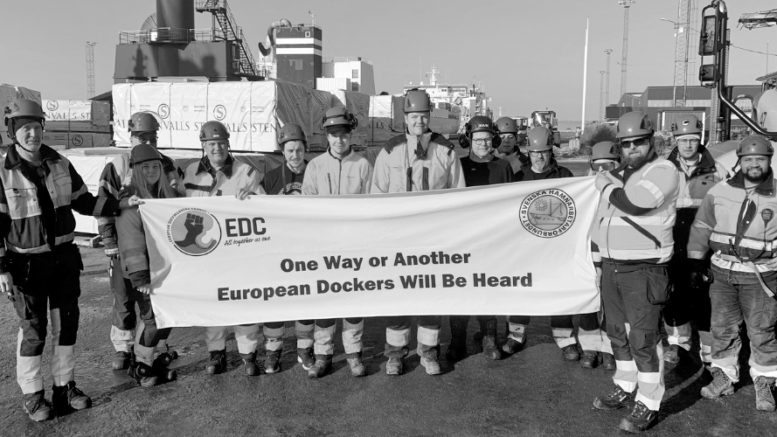By Katy Fox-Hodess and Rafeef Ziadah
In a resounding display of international solidarity, members of the Swedish Dockworkers Union SDU voted by 68 percent in December to block the handling of military shipments to and from Israel.
The Swedish government continues to trade arms with Israel. Exports are relatively small, totaling $4.5 million in 2023, but imports are much more significant: the Swedish defense forces have signed contracts to import more than $200 million in arms from Israel, including from two of Israel’s largest arms companies, Elbit and Rafael—both implicated in supplying weaponry used in Gaza.
So dockworkers are stepping in where elected officials have failed to uphold human rights.
The blockade is also a call to action for workers worldwide. The SDU has a long history of putting its money where its mouth is when it comes to international solidarity. In the 1970s, the Swedish dockworkers were the first to refuse to handle cargo from Chile after the coup d’etat. They were also the first in Sweden to boycott South African cargo in solidarity with the anti-apartheid movement.
More recently, in 2010, Swedish dockworkers led a week-long refusal to handle Israeli goods following the military attack on the Mavi Marmara flotilla of civilian activists carrying humanitarian aid to Gaza. Their action inspired dockworkers in far-flung countries—including ILWU Local 10 in the San Francisco Bay Area—to take part in “Block the Boat” actions in 2014 and 2021.
And in 2022, Swedish dockworkers faced legal challenges after blocking Russian goods in protest of the invasion of Ukraine. That experience prepared them to confront similar challenges this time around.“We’re expecting a strong pushback from the Swedish government and other actors in the coming weeks,” said Erik Helgeson, SDU’s vice chair, “but our experience tells us that if we hold the line, the backlash will pass. In the long run, it’s not unions taking a stand to defend human rights that future generations will condemn —it’s the indifference and profiteering from war that they will find impossible to justify.”
‘We have to do what we can’
This vote comes in the shadow of mounting evidence of atrocities in Gaza, where the humanitarian crisis has reached catastrophic levels. According to the latest reports from the United Nations Office for the Coordination of Humanitarian Affairs, more than 45,338 Palestinians have been killed, and many more are believed to be under the rubble.
In a detailed analysis of 8,119 deaths between November 2023 and April 2024, the United Nations Human Rights Office found that 44 percent of verified victims were children, with the largest proportion aged five to nine years old. Gaza’s already fragile infrastructure has been decimated, with acute shortages of food, water, and medical supplies.
“Our members refuse to accept ’business as usual’ when at least 3,000 Palestinian children under the age of five have been killed,” said Helgeson, “and more are dying from imposed malnutrition and dehydration. We feel we have to do what we can to disrupt trade that is prolonging this horrifying situation by funding or arming Israel.”
Rank and file decided
The decision is particularly significant because it wasn’t handed down from leadership, but voted on by members. It shows how open debate within a union can lead to bold collective action. Members who feel informed and empowered are more likely to support actions that align with their values—even when those actions carry risks.
Organizers emphasized the importance of educating members about the issues, holding transparent discussions, and ensuring that everyone’s voice was heard. By involving the rank and file at every step, they turned what could have been a divisive issue into a powerful statement of collective resolve.
The SDU is one of the only unions in Sweden that has remained independent of the mainstream labor federation and political parties. Since its founding in the early 1970s, this independence has enabled it to engage in both militant defense of members’ interests and impressive international solidarity actions driven by the membership through a highly democratic model.
The vote follows consistent advocacy by the group Workers in Palestine, which has called on unions worldwide to take tangible steps against military trade with Israel.
Dr. Katy Fox-Hodess is a Lecturer in Employment Relations and Research Development Director of the Centre for Decent Work at the University of Sheffield in England. An expert on global dockworker trade unionism, she is a co-founder of the International Labour and Logistics Research Network.
Rafeef Ziadah is a Palestinian-Canadian poet and human rights activist who currently lives in London.
Source: labornotes.org, January 16, 2025

